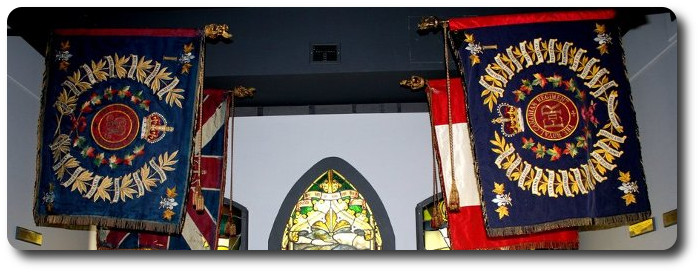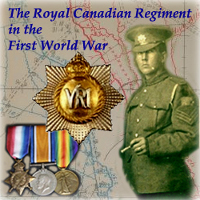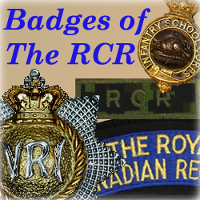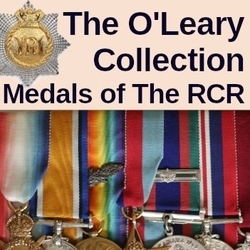
Researching The Royal Canadian Regiment
The RCR Goes to War
By LCol E.H. Shuter
Pro Patria #24, May 1975
Using the touch of the writers of old installment thrillers, the first letter ended on a note of a high pitch of excitement as the unit was going to WAR. Our highly trained unit had been led to believe that in the event of war, we would break up to form the core of the expanding Army. With typical Army crisis management, this noble plan was tossed aside and the RCR was mobilized as a unit. In September 1939, as the horses moved out of their palatial quarters in the C.N.E. grounds, B Coy took over a portion of the building as a barracks. The stable aroma did not bother us after a few days, but it did tend to set us apart when we visited in the city. Old members vanished suddenly to move to other postings, recruits were added, and equipped through the whimsical services of our meagre stores with odd mixtures of serge, fatigues, straw hats, PT shoes, etc.; an odd mixture it must have been to the eye of Gen. McNaughton who came to review the "Toronto Garrison"!
As in all Army adventures, the picture changed sharply. The next slide shows us equipped in an uncomfortable new type of uniform designed by some humourist and called "Battle Dress", with a wee cap perched on, or fallen off, one side of the head, full marching order with kit bags over the shoulder, and bidding farewell to the urban scene of Toronto. The next slide shows us in the delightful rustic setting of Valcartier summer camp in the winter. Yes! Real winter with white snow on the green trees, mountains, etc., beautiful, but much too cold for the one stove per hut to cope! Here we see the rapid shuffling from Coy to Coy as we try to make a first class battalion out of the mixture available. Training could be called difficult under these circumstances, and to avoid such problems, I became sort of permanent orderly sergeant to Tommy Barrett who had risen to dizzy heights of CSM - and he couldn't stand heights.
The scene changes again as we flounder through that lovely Quebec snow to board a train, which, in our blind faith, we assumed to have a logical destination which was to be kept a deep secret from all of us. Some of you will remember those cosy old trains with wooden cars, with a dash of leather of the seats. "Colonist cars" was the name I believe, built to last, to survive the onslaught of those crude colonists or rough soldiers, but of course no comfort!
To the surprise of no one, the train huffed its way to dreary dockside in Halifax and we were urged to herd the men into the overgrown row-boat moored at the dock. This peculiar craft was called a "mail packet", presumably designed for moving vast quantities of unfeeling mail and thus ideal to accept large numbers of soldiers packed tightly and balanced carefully in its bowels. Balancing was vital since this vessel pitched and tossed in the harbour. The scene darkens as we pause in memory of a ghastly trip to Scotland, which; to no one's surprise, was our destination. There was a small problem on arrival when we staggered on deck to find that we were to disembark by even smaller craft cleverly dubbed a "lighter", because it was. This joyous ride surpassed the thrill of the roller coaster ride at the C.N.E. by its simultaneous four-way motion in riding up and down every wave to reach the dock. Swaying on the dockside to the movement of the now lighter lighter, we were drawn up in some semblance of order to receive a Scotch welcome, complete with a band playing a typical Canadian tune - "Rollout the Barrel". Then the mob was herded aboard a cosy English train for a trip to Aldershot. The train was nicely equipped with facing seats, and a table firmly anchored to the floor between them, thus facilitating card playing and completely frustrating any attempt to sleep!
The many difficulties of the trip ended as we reached our luxurious new home in Barossa Barracks in Aldershot. These stern old building were built on the erroneous assumption that the English weather is quite mild in the winter, and, so each barrack room was afforded the comfort of only one tiny fireplace to heat it, and a tinier ration of coal for the fire! The plumbing was neatly fixed to the exterior of the building on the same peculiar assumption, and on exposure to an "unusually bad winter", froze every night. The beds were fiendishly designed for neatness by the use of a three piece bolster as a mattress which could be nicely made up during the day to a neat pile - but was not conducive to slumber! Our diet was enhanced by visits to the English NAAFI where we were introduced to a patented brand of tea not found anywhere else in the world, to eggs and mash, sausage (?) and mash, etc. For those who had good night vision in the blackout, there were visits to the local pubs where the flinty eyed pub keepers have seen soldiers come and go for many a decade and accepted no nonsense from them - only money.
To return to the theme of "how to succeed", etc., there were sports again. This time there was a novel invention called "tabloid sports", with points awarded for attaining various easy levels. This was great fun, being average in most sports, it was easy to become an "athlete" again. Various game sports were started, such as inter-company basketball, and here we find the old B Coy team scattered through other companies now in opposition. I believe that Klink Klenavic did recover from my elbow in his ribs and my accidental stepping on his foot? This prowess undoubtedly led to my next avoidance of work to become a "drill sergeant" under RSM Frank Darton, with Ernie McNamara, Bob Richards and Eli Littleford. This led to the part-time job of teaching drill to the Bde H.Q. Staff, a job giving sadistic pleasure to me and great pain to them! But I got carried away on this one. After our hurried trip for the "Dover Dash " to go to relieve Dunkirk, which we didn't , there were a lot of disgruntled absentees who were given pack drill each evening under the delighted view of our neighbours in the detention barracks, the "Glasshouse". The trip to France followed. Again no idea what was happening, a choice menu of bully beef and hardtack, "40 men or 8 horses", train cars complete with straw, exodus from France less most of our vehicles, then to D Coy as Platoon Sgt., to the Midlands, life in billets, then to the fields south of Reigate in tents and we were to repel the enemy who failed to come except by air. Thus we fought the Battle of Britain and trained by marching weary miles each day. The athlete bit came again as I attended the first "commando" course and taught unarmed combat for ages thereafter.
To escape from such arduous duties, I graciously accepted the post of being an instructor at the 7th Corps Junior Leaders School, Shillinglee Park, a truly delightful rural retreat. Here because of my size, I was the star attraction for each course by demonstrating the use of rope sling fire escape from the attic. Ironically, it was put to the full test about a year later when the place burned down. The first course had Eli Littleford as a student; being a professional, he was awarded a "D" rating and the unit got so excited that he was sent to OCTU! The ratings were then "re-studied" by the Commandant and such subsequent stalwarts as Bob Richards and Tommy Burdett received lesser ratings for similar standing. During this tour, I visited the Holding Unit at Bordon to be royally received by my proud father, then RSM of the General Holding Unit. He had magically shed ten years from his age to rejoin, and managed to get away with it for several years, until they discovered his previous record as an RSM in Barrie and a Lieutenant in Toronto.
Hearing rumours of promotion, a visit to the unit was in order where I was greeted by the 2 i/c, Maj. T.E. Snow, who outlined the one and only reasonable career plan I was to receive. This involved giving up my soft touch as an instructor and returning to the Unit as a CSM of C Coy under Maj. J.H. Macdonald, a job made ridiculously easy with platoon sergeants like Murray MacDonald, Tommy Burdett and Jack Morgan - they made me look good enough for all four of us to be sent to OCTU to finally achieve that great ambition of becoming an officer, complete with blue blazer, etc. Now a funny thing had happened on the way to achieving this ambition, officers had suddenly become leaders of men and had to WORK! But all was not lost. MY luck held as I was sent to teach the Artillery how to use small arms as they exchanged instruction in gunnery, a useful exchange. This phase of my career was completely unstructured, and allowed me to travel from unit to unit when I pleased; what more could be asked?
The scene changes quickly with a visit to Hospital, a visit to the South Coast of England to man the defences while the real soldiers suffered Exercise "Tiger", and then to the Holding Unit. Here they had a quaint system of first in first out to units; all others do nothing. This lasted less than a week as I was "called to the colours" (of the track team) arranged by Eric Forgraves as there was a big meet coming up. Back to the unit to find everyone athletic (T. Eric Snow was CO) and although I had a platoon, the big effort was track and field. The Brigade meet at Arundel Park on the Duke's cricket pitch was great fun. MY usual passing form in various sports was exceeded in the high jump, Where success was achieved with the assistance of a battery of 9.2 howitzers firing from the edge of the field - it is truly amazing how high you can jump when they fire!
Sports continued to the exclusion of all else, Next came the Division meet where I received some real coaching in the high jump from some Aldershot PI School instructors, and used it to good advantage. This led to a so-called training camp of the Divisional team for the Army meet, held in Brighton of all places; the social life was far more demanding than the training. This all finished at the Army meet in Aldershot, and there was nothing to do but return to the unit. Fitness had now taken another twist with mad attempts to run-walk ten miles in two hours. I had my nice new brown boots for this effort, and the blood didn't leak through them once! Still at Arundel, with Sam Macknets sniping deer with 3" mortars to agitate the Duke. I found that having a platoon was really great fun and vital training. The constant marching was a bore, and on the move to Possingworth Park, I escaped it by being made A.A. Platoon Commander and riding a motorbike while my sharp-shooting Bren gunners laboriously Wheeled along on British Army bicycles -an amusing sight to see them in action as they were heavy bikes and very hard to pedal. This job also carried with it the role of Asst Adjt Sandy Mitchell was Adjt). The duties were mainly those of finishing an obstacle course which a fiendish Dick Couche had started, and paying the CO's rent at the Possingworth Park Hotel, and joining the social life there the odd evening.
Another benefit of being in the A.A. platoon was that special courses were provided to teach us colonials how to distinguish between "theirs" and "ours" and how to shoot "theirs" down, but not "ours". This was a very sensible precaution and the platoon became quite expert in these fine arts but to no great avail since there never was an opportunity to shoot down either class. Another type of course was held at Bisley for officers, and I was selected for that one. The CO of the course apologized for the mistake of designating the course light AA when it was actually medium - i.e., Vickers MMG. By a modest denial of a knowledge of this fine weapon, there followed some boring basic lessons until I carelessly cleared a third position stoppage which had not been taught, so I was put to work as an instructor. Simulated firing on the "Dome" at Bisley was excellent practice for an unrequired art of war since our platoon was phased out of the organization soon after this event.
Other scenes flash by, the trooping of the "banner", the scrambling nets and obstacles, the moving "on the double" at Possingworth, the trip to Scotland, Christmas greetings exchanged at dawn after a very wet landing, mock landing craft, night living at Eastbourne, 0200 hours farewell parade to I. Eric Snow, arrival of Ralph Crowe and J.H. W.I. Pope as his 2 i/c, toughening the unit, eliminating the unfit -we were going someplace!


